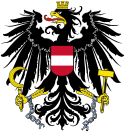Supreme Military Commander of the Bundesheer
| Supreme Military Commander of the Bundesheer
Inhaber der Befehls- und Verfügungsgewalt über das Bundesheer | |
|---|---|
 | |
 Roundel | |
| Austrian Armed Forces | |
| Style | Herr. Bundesminister (formal) |
| Status | Supreme commanding authority |
| Member of | National Defence Council |
| Reports to | President of Austria (officially) |
| Residence | Rossauer Barracks |
| Seat | Vienna |
| Constituting instrument | Federal Constitutional Law Wehrgesetz |
| Precursor | Emperor of Austria as supreme commander of the Armed Forces of Austria-Hungary |
| Website | bundesheer.at (in English) bundesheer.at (in German) |
The Supreme Military Commander of the Bundesheer (German: Inhaber der Befehls- und Verfügungsgewalt) has command and control over the Austrian Armed Forces (German: Bundesheer), a position vested in the Minister of Defence. This position is given to the Defence Minister with article 80 of the Federal Constitutional Law[1] and paragraph 3 of the Wehrgesetz[2] of Austria.
The right to command and control the Bundesheer is subject to the Minister, as long as it is not subject to the Federal President (which is the nominal commander-in-chief). In practice however the President can never really command and control the armed forces and thus the Minister always stays the supreme commanding authority.
See also[edit]
External links[edit]
- bundesheer.at (in English)
- bundesheer.at (in German)
References[edit]
- ↑ "Art. 80 B-VG". www.jusline.at (in Deutsch). Retrieved 2018-05-26.
- ↑ "Wehrgesetz 2001 - WG 2001". www.ris.bka.gv.at (in Deutsch). Retrieved 2018-05-26.
This article "Supreme Military Commander of the Bundesheer" is from Wikipedia. The list of its authors can be seen in its historical and/or the page Edithistory:Supreme Military Commander of the Bundesheer. Articles copied from Draft Namespace on Wikipedia could be seen on the Draft Namespace of Wikipedia and not main one.

